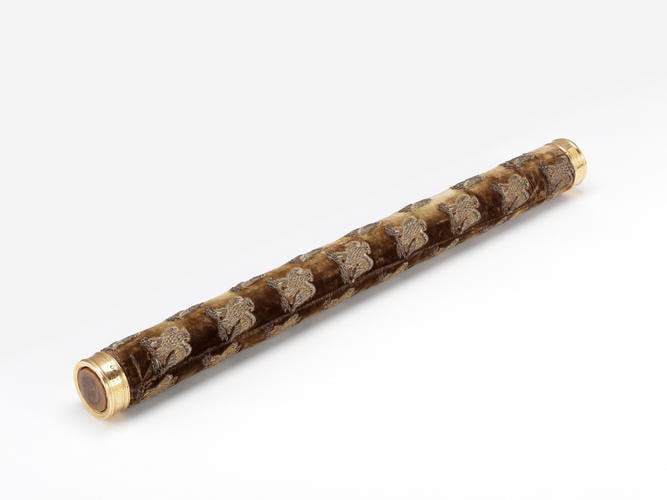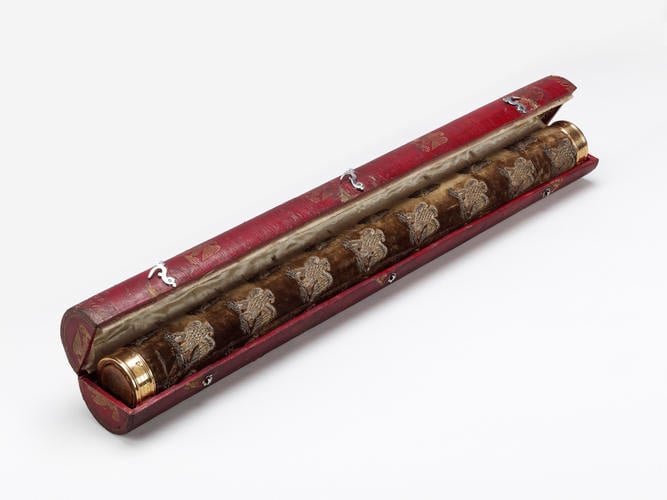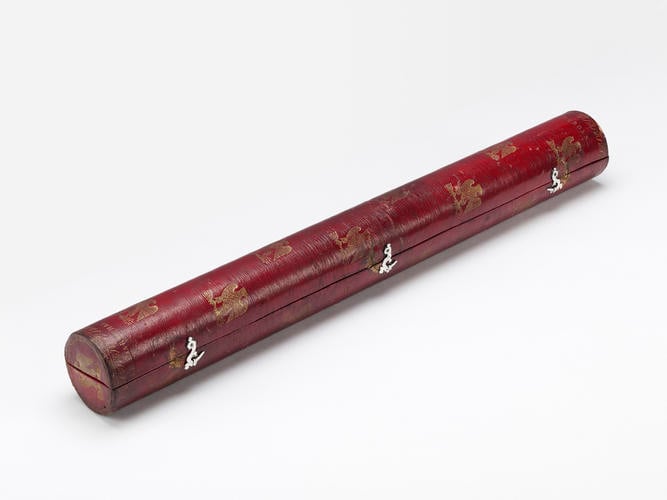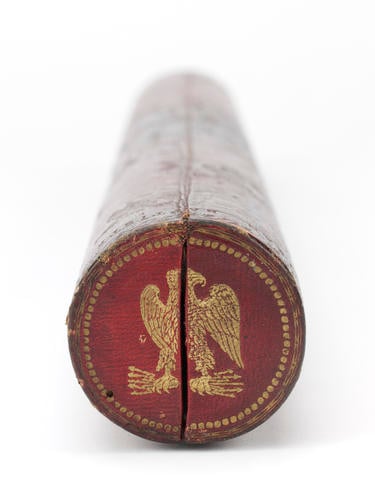-
1 of 253523 objects
Marshal Jourdan's Baton and case 1804
Baton: wood, velvet, gold, thread. Case: red leather | 47.7 x 4.2 cm (whole object) | RCIN 61176

France
Marshal Jourdan's Baton and case 1804

France
Marshal Jourdan's Baton and case 1804

France
Marshal Jourdan's Baton and case 1804

France
Marshal Jourdan's Baton and case 1804




-
A wooden baton covered in (now faded) blue velvet, applied with silver and gold threaded Imperial 'grand aigles' holding Jupiter's thunderbolts in their talons, gold ends and with a wooden core. Fitted in a red morocco leather box tooled with gilded 'grand aigles'.
The baton finials are stamped with the Paris assay and duty marks for the period 1798-1809.Provenance
A baton is the symbol of authority and distinction and in France that of a Maréchal de France. It is not a military rank but is granted to generals for exceptional achievements. It was one of the 'Great Officers of the Crown of France' during the Ancien Régime and Bourbon Restoration and one of the 'Great Dignitaries of the Empire' during the First Empire when it was known as the Maréchal d'Empire.
The baton is a cylinder decorated with eagles, symbol of power and authority, and engraved with the Latin inscription 'Terror belli, decus pacis' (Terror in war, ornament in peace). This baton is also engraved with the inscription 'Jean Baptiste Jourdan Nommé par l'Emperor Napoléon Maréchal de L'Empire le 29 Floréal Anno 12e' (from the French Republican calendar 19 May 1804). Marshal Jourdan had enlisted as a private in the French royal army and served in the American War of Indpendence and commanded armies with distinction during the French Revolutionary Wars.
Jourdan's baton was found amongst his personal baggage captured at the Battle of Vitoria on 21 June 1813 when a combined British, Portuguese and Spanish army under General the Marquess of Wellington (as the Duke of Wellington then was known) defeated the French army under Joseph Bonaparte (the Emperor's brother) and Marshal Jourdan near Vitoria in northern Spain; this success eventually led to victory in the Peninsular War.
An extract from the despatch to Lord Bathurst, Secretary of State for War and the Colonies, from the Marquess of Wellington dated 22 June 1813 from Salvatierra reads 'I send this despatch by my A.D.C. Captain [John] Freemantle whom I beg leave to your Lordship's protection. He will have the honour of laying at the feet of H.R.H. The Prince Regent the Colours of the 4th Batt of the 100th Regt (RCIN 61157) and Marshal Jourdan's baton of a Marshal of France [sic.] taken by the 87th Regt. I have the honour to be etc. Wellington'.
The Prince Regent was delighted with the gift and on 5 July 1813 wrote to Wellington ' You have sent me among the Trophies of your unrivalled Fame, the Baton of a French Marshal and I send you in return that of England. The British Army will hail it with enthusiasm while the whole Universe will acknowledge those valorous Exploits, which have so imperiously called for it...'.
Presented to George IV when Prince Regent, by Arthur Wellesley, 5 July 1813. -
Creator(s)
(nationality)Acquirer(s)
-
Medium and techniques
Baton: wood, velvet, gold, thread. Case: red leather
Measurements
47.7 x 4.2 cm (whole object)
Category
Object type(s)
Other number(s)